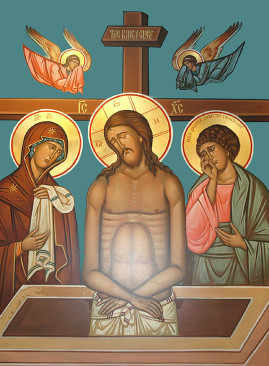ARCHPASTORAL EPISTLE OF HIS BEATITUDE, METROPOLITAN JONAH FOR THE BEGINNING OF GREAT LENT 2010

To the Very Reverend and Reverend Clergy,
Monastics, and Faithful of
The Orthodox Church in America
Dear Brothers and Sisters in Christ,
The gateway to divine repentance has been opened: let us enter eagerly, purified in our bodies and observing abstinence from food and passions, as obedient servants of Christ who has called the world into the heavenly Kingdom. Let us offer to the King of all a tenth part of the whole year, that we may look with love upon His Resurrection. [Cheesefare Monday, Matins sessional hymn]
We approach the Great Fast as our preparation to celebrate the life-giving Passion and Resurrection of our Lord Jesus Christ. Great Lent is a time of great beauty and profundity, a time which the Church calls the “tithe of the year” which we give to Christ in a spirit of fasting and self-denial. We fast, we pray, we go to services, and we give alms. But what is different in us the very day after Pascha? Have we attained inner peace? Have we come to self-control over our passions? Has my soul been healed, even a little?
Lent is the time for repentance. But that repentance does not simply mean feeling sorry for our sins, much less trying to do some kind of penitential acts to atone for them. Rather, the goal of repentance is the transformation of our minds and hearts, our very consciousness. It means a transformation of our whole life. To engage it means that we have to embrace change. This change not only affects our diet for a few weeks, or abstaining from some bad habits. It means a different way of behaving, of perceiving God, ourselves, our neighbors. It means a rejection and renunciation of the ways we have been living and treating others, and the adoption of a new way of life. We have to come to the recognition that how we have been living and behaving does not lead us deeper into communion with God and our neighbors, but rather alienates us from both, and from our very self.
So often we become trapped by our own self-righteousness and pride, thinking that we do not have to change. This is delusion. If we are so sure of ourselves, how have we left room for God to even show us our shortcomings? We fall into the trap of the Pharisee. This is especially the case when we let ourselves criticize and judge our neighbors. If we allow ourselves to judge and criticize, then we can be sure that we have cast God out of our lives. Who needs Him, if I can judge everyone and everything? We pick and pick at our neighbors, from external appearances to deep judgments about their integrity. And in so doing, we destroy our own souls. We project all our own insecurities on those around us, not caring whose feelings we hurt or whose lives we destroy. And in reality, it has nothing to do with that other person; our judgment is only an image of myself and my insecurities, and the sins we don’t want to admit to ourselves.
If we judge and criticize our neighbor, our fasting is in vain. Our repentance is hypocrisy. And we make a mockery of Jesus Christ. We receive the Eucharist unto damnation. And we are oblivious to it, in our own self-righteousness.
Repentance, being “transformed in the renewal of our minds,” means that, like the Prodigal, we have “come to ourselves,” and recognized that our minds and hearts have taken the wrong road. We can perhaps see some of the damage we are causing to ourselves and others. We recognize that our minds are filled with angry, suspicious, judgmental, and self-righteous thoughts, and that we have no inner peace.
How do we repent? The first thing we must do is withdraw from the stimulus: to stop exposing ourselves—temporarily—to the issues and people that bring up these angry thoughts and judgments. We have to stop ourselves from rehearsing the wrongs done to us (and hence our judgment and condemnation of the person who wronged us), and realize this is just our own self-justification rooted in pride and vainglory. Then we need to pray that God will forgive us for our anger and pride, and forgive the other for what he or she has done. Then we can let it go. So long as we are provoked by thoughts of the remembrance of wrongs (resentments), and react with anger, we have not worked it through. But when the remembrance of something no longer disturbs our peace, we know that God has worked in our hearts.
Great Lent can be a clinic, a hospital, for our souls that are sick with the passions. Have we been healed? We can have our minds and hearts lifted up to heaven itself, if we want. We can use Great Lent to lay the foundational stones of discipline, and build habits that will stay with us the rest of the year. We can emerge from Lent with our hearts illumined and our minds cleansed, with a new way of being. Will we allow ourselves to change and be transformed in repentance?
It is only this transformation that will open our spiritual eyes, that in our hearts and with all our being we will be able to shout with joy, “Christ is risen from the dead, trampling down death by death, and upon those in the tombs bestowing life!”
With love in our Merciful Savior,

+JONAH
Archbishop of Washington
Metropolitan of All America and Canada
